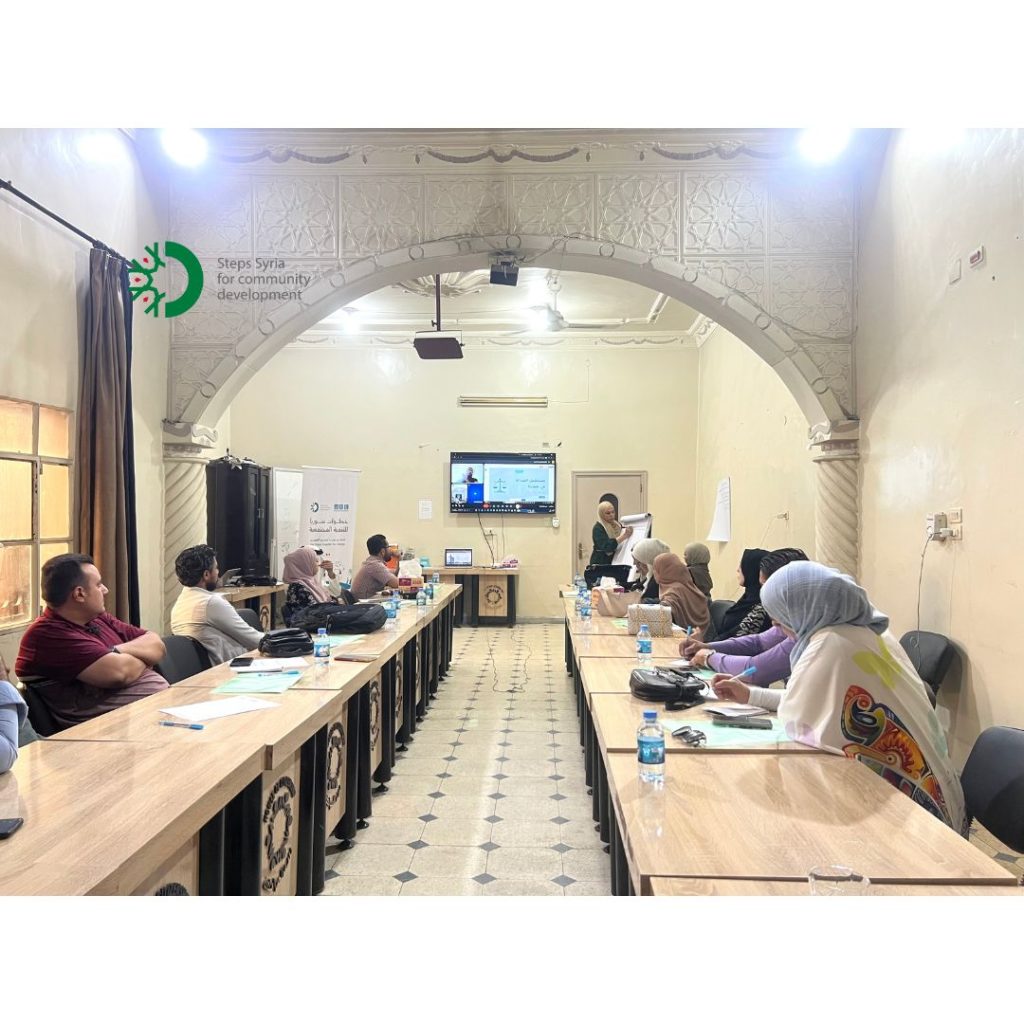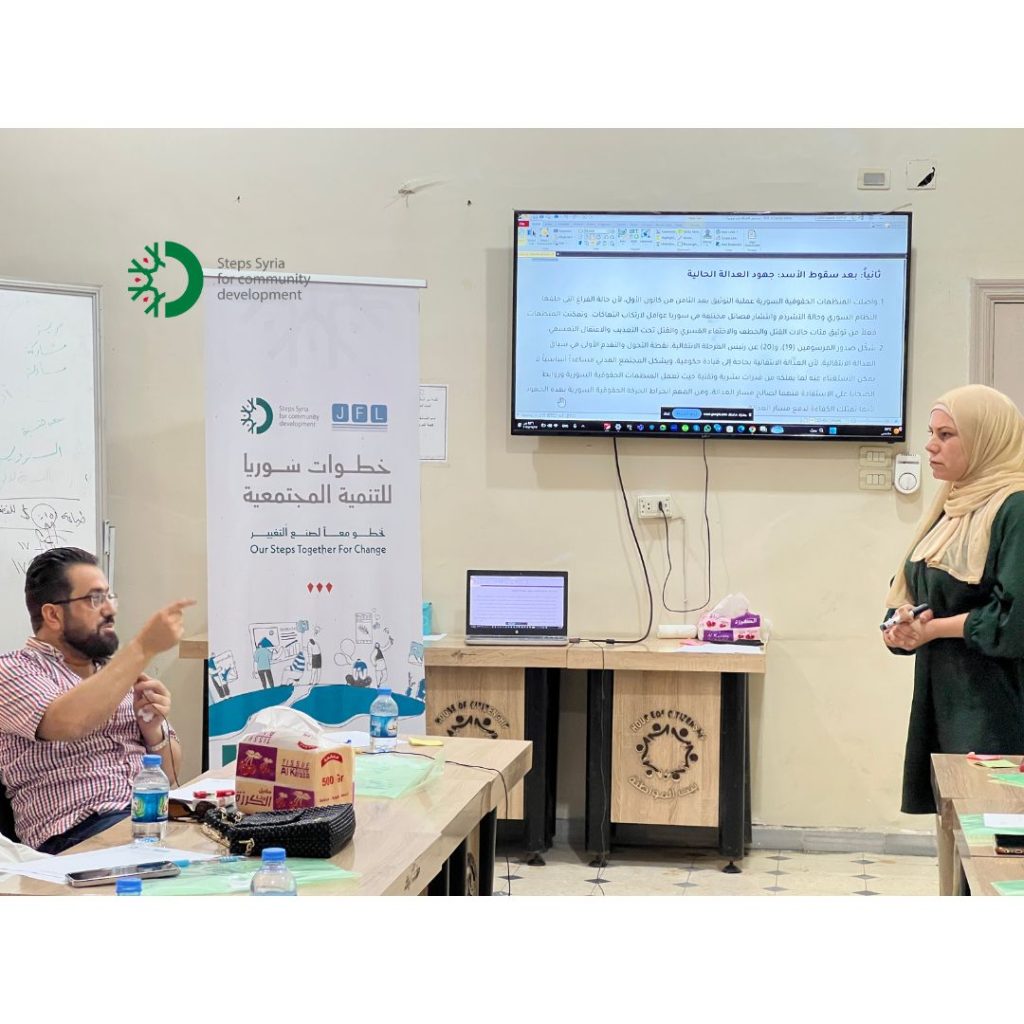Raqqa | Steps Syria Foundation – Justice for Life Organization
Raqqa, July 7, 2025 – In a step to formulate a comprehensive community vision for transitional justice in post-liberation Syria, the Steps Syria for Community Development Foundation, in cooperation with the Justice for Life Organization, organized a dialogue seminar titled “Transitional Justice from a Local Perspective” in Raqqa city. The session was attended by 14 individuals from diverse backgrounds, including representatives from civil society organizations, community influencers, human rights activists, representatives from local authorities, and political parties.
Justice After Wars: Visions from the Heart of the Community
The seminar aimed to form an initial vision of the form of transitional justice that satisfies Syrian communities, given the historical opportunity available to victims of violations after the fall of the regime. The meeting opened with a welcome to participants and an introductory activity that posed a fundamental question: “If I asked you to write a message to the next generation about ‘Justice after Wars,’ what would you write in just one line?” The answers varied, emphasizing the importance of reparations, accountability, documentation, and education as pillars of justice.
Trainer Jalal Al-Hamad, Executive Director of the Justice for Life Organization, participated online, emphasizing that the satisfaction of local communities is essential for achieving justice, and that its path begins from the street and ascends to the top of the hierarchy.
Transitional Justice Decrees: Hopes and Concerns
Participants discussed the recently issued decrees (19 and 20) by the Syrian Transitional Government, which relate to the formation of the Supreme Commission for the Missing and the National Commission for Transitional Justice. Despite welcoming the formation of these bodies as a response to popular demands, participants expressed concern and skepticism about the implementation mechanisms, the lack of transparency, and the comprehensiveness of accountability for all perpetrators of violations without exception.
The Role of Civil Society and Media in Restoring the Path of Justice
An in-depth discussion took place regarding the roles that civil society, media, women, and influential figures can play in rectifying Decree 20 and supporting the transitional justice process. Participants stressed the necessity of independent media for oversight and documentation, the importance of educating people about the decrees and their rights, and mobilizing the public to demand justice.
It was emphasized that civil society must have an effective role in documentation and evidence collection, providing training to the local community on transitional justice, and communicating with specialized organizations. The local community must also have a role in documentation, women must have a role where they are not marginalized, and key figures must have a role in community influence, awareness, conflict resolution, and reconciliation. As for the media, it must be transparent and impartial, not politicized, and highlight community issues and the transitional justice path.
Interventions touched upon challenges such as the absence of effective representation of victims’ families in the bodies, the lack of a clear action plan, and the fragmentation of involved factions. It was also stressed that transitional justice is not revenge, but a framework for addressing violations and achieving fairness and reconciliation, and that it is a long and complex but necessary path to stability.
Challenges of Transitional Justice: Multiple Perspectives
The discussion faced many challenges, including the absence of clear controls for criminalization and judgments, and the lack of organized and accurate documentation of violations. The culture of revenge and vendetta in communities also poses an obstacle. Participants pointed out that the former regime enacted laws that served its interests and weakened national sentiment, creating rifts between sects. They questioned the criteria for releasing prisoners and amnesty, emphasizing that the private right of the victim is not waived by general amnesty.
Challenges also emerged regarding the involvement of multiple categories and factions in violations, which contributes to diluting accountability. Participants stressed that the failure to activate the role of the judicial institution leads to people taking their rights into their own hands. Issues of land and property seizure were also raised as ongoing disputes requiring a solution.
The trainer affirmed that the Syrian context is not uniform; each region has its specificities regarding violations, and this context determines the mechanisms for achieving justice. He emphasized that transitional justice is a “purely societal product” with determinants (equality, inclusiveness, non-discrimination), and that civil society efforts have been crucial in uncovering and documenting facts.
The seminar showed that the local community in Raqqa has a clear understanding and vision of transitional justice, is capable of analyzing the local and national context, and has the desire to propose solutions and recommendations to achieve the desired justice. The Steps Syria for Community Development Foundation reaffirms its commitment to continuing to support these efforts to ensure the building of a Syria based on justice, equality, and respect for human rights.
Steps Syria, in cooperation with JFL, Holds a Session in Raqqa Discussing the Role of Syrians in Achieving Transitional Justice https://www.facebook.com/share/v/1CXQyX72DP





